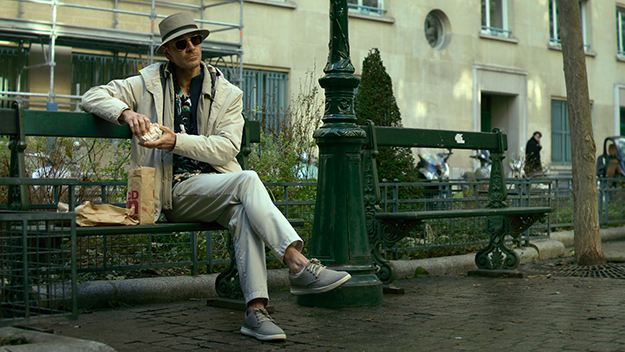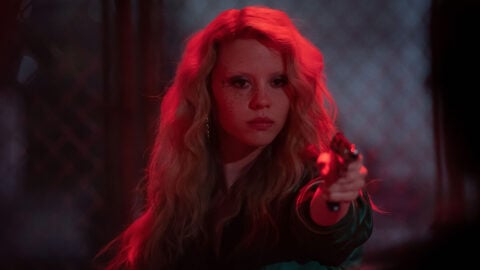This Charming Man
This article appeared in the November 16, 2023 edition of The Film Comment Letter, our free weekly newsletter featuring original film criticism and writing. Sign up for the Letter here.

The Killer (David Fincher, 2023)
It’s been a good year, cinematically speaking, for hit men in Paris. John Wick: Chapter 4 staged its wittiest set pieces in the City of Lights, whirling a bone-crushing melee around the Arc de Triomphe followed by a tour-de-force massacre accounting for each of the 270 steps leading up to Sacré-Coeur. With The Killer, David Fincher opens one of his slyest, most concentrated pictures in a chic arrondissement where an unnamed assassin (Michael Fassbender) holes up in an abandoned WeWork office with a view into a penthouse hotel suite, and waits, and waits, and waits for his target to arrive.
How to kill time? A little yoga, breakfast sandwiches at McDonald’s, some faux-casual flâneurie while masquerading as a German tourist. And for entertainment, listening to The Smiths and monologuing about the nature of being a sociopath-for-hire. When the moment finally arrives (on his headphones: “How Soon Is Now?”), the assassin rehearses his mantra while steadying his rifle. “Stick to your plan. Anticipate, don’t improvise. Trust no one. Never yield an advantage. Fight only the battle you’re paid to fight. Forbid empathy. Empathy is weakness. Weakness is vulnerability. Each and every step of the way ask yourself: ‘What’s in it for me?’ This is what it takes. What you must commit yourself to. If you want to succeed. Simple.”
Bang—not so simple. A sex worker hired by the mark unexpectedly steps in front of the bullet. As the killer packs up his gear, zips around Paris evading the police and ditching bits of evidence, and hops on a flight using one of the dozen false identities he has stashed around the globe, the viewer could be forgiven for finding these proceedings rather familiar, albeit delivered with the finesse—no small feat—of Fincher’s laser-tooled precisionism. (The movie’s tagline, “Execution Is Everything,” is a droll bit of self-congratulation.) The Killer sticks tightly to the parameters of a template established by Le Samouraï (1967) and given a more recent workout in the Bourne franchise: a hit goes awry; the asset, left out to dry, undertakes a project of sleuthing and slaughtering his way back to the original client.
But there’s more astir in this opening “Chapter”—as the movie titles its narrative sections—than meets an eye well-versed in the Taciturn Assassin genre. (The screenplay, by Se7en scribe Andrew Kevin Walker, is adapted from a series of French graphic novels.) For starters: the soundtrack. Trent Reznor and Atticus Ross have programmed one of their most minimal and menacing scores, inflecting the narrative with terse, throbbing bass notes that sync up with the killer’s metabolism, which he carefully monitors with a fitness tracker. Then there’s The Smiths. Eleven of their best-known tracks play across the film, cued up by the assassin as he makes his moves. Perhaps it’s my own Gen-X bias to have found this utterly delightful, but even nonfans (and we can all agree that Morrissey is trash) have to admit that scoring a hit-man flick to The Smiths is an inspired conceit that cuts against the grain of the film’s machinic engineering. Their music is everything the assassin is not: melodramatic, melancholy, sarcastic, romantic.
And then there’s that voiceover. Again and again he recites his talismanic aphorisms: “Stick to your plan. Anticipate, don’t improvise. Trust no one. Never yield an advantage. Fight only the battle you’re paid to fight. Forbid empathy. Empathy is weakness. Weakness is vulnerability.” The movie deploys these slogans to shrewd effect at moments when it’s unclear if the killer can stick to his plan, if he will improvise, if empathy might creep in. Moreover, the entire film concerns a battle—the botched hit—that he hasn’t been paid for.
His payment, rather, will be the step-by-step process of retribution (Fincher loves a process). Absconding to his safe house in the Dominican Republic, the assassin discovers it ransacked and a loved one brutalized, as various agents in the homicidal chain of command attempt a cover-up of the Paris mishap. The narrative is structured as a revenge quest as he follows the money back to its source, an itinerary that leads from the Dominican Republic to New Orleans, Florida, New York State, and finally Chicago. The Killer is, like many a Taciturn Assassin number, perpetually on the move. At least half the film involves some form of transit: renting cars, catching flights, jumping on ferries, zipping between cities by train. With each mode of travel comes a new ID card, and as this propulsive film forges ahead, leaving a trail of deftly executed Chapters in its wake, it becomes clear that, more than simply a trope of the genre, this flow of movement greased by an endless supply of credit cards and exchangeable identities is itself part of the point.
“Whatever it takes,” the assassin muses in his WeWork den, “make sure you’re one of the few, not one of the many.” In more ways than one, The Killer is about how this seemingly rarified Übermensch is really just a late-capitalist normie with a deadening, repetitive job, who drinks Starbucks, joins an upscale gym, and orders gadgets on Amazon. If the movie strikes some as boring, it’s because tedium is an explicit theme. The Killer is an extremely dry workplace satire masquerading as an action film. This is neatly summarized in the climactic face-off with the originator of the Paris job, which a friend described as “the idea of finally getting to confront the Big Boss of Capitalism, and he’s some aging yuppie in a Sub Pop T-shirt who can’t even remember what he did to screw you over.” The movie inverts the organizing psychosis of Fight Club (1999): the Killer is a Tyler Durden who comes to realize he’s a generic cog in an IKEA world. If the epilogue drives this point home a little too emphatically, it’s salvaged by a wondrous glitch in the killer’s seamless body language that ruptures the texture of the film with more force than the dick pics Durden splices into family matinees.
The enormous skill Fincher expends to make it look so easy finds an ideal partner in his star, no stranger to playing automatons. Throughout The Killer, Fassbender asserts a control of posture and affectless fascination worthy of Isabelle Huppert, even as he pulls off an uproarious fight scene that John Wick would applaud. (Denial of empathy notwithstanding, he does share Wick’s fondness for dogs.) A late, delicious scene in which the assassin settles scores with a rival played by Tilda Swinton as she dines in a white-glove restaurant is a master class in who can Ice-Queen the other to death. I’ll never forget the parable she delivers about a hunter sodomized by a bear, nor her character being described as a “Q-tip.” As for The Killer, it may be received in some quarters as a polished if forgettable genre exercise—Alexa, play “Stop Me If You Think You’ve Heard This One Before.” And if it is? Okay, but show me polish this bright.
Nathan Lee is an assistant professor of film at Hollins University and a longtime contributor to Film Comment.







